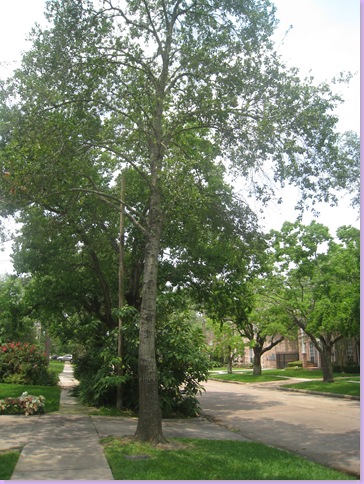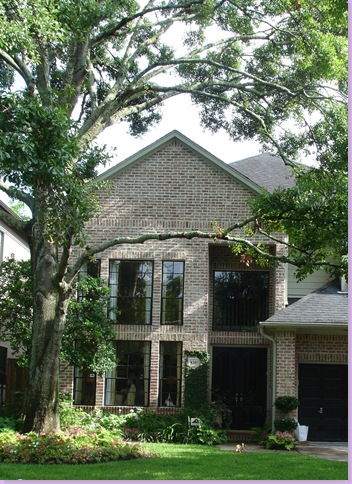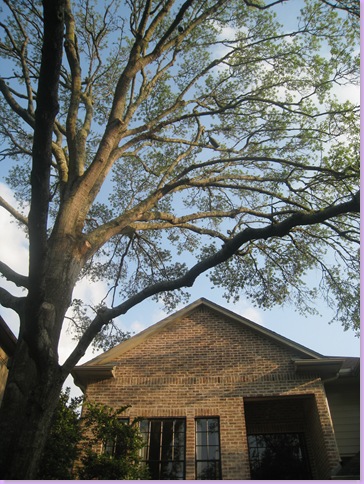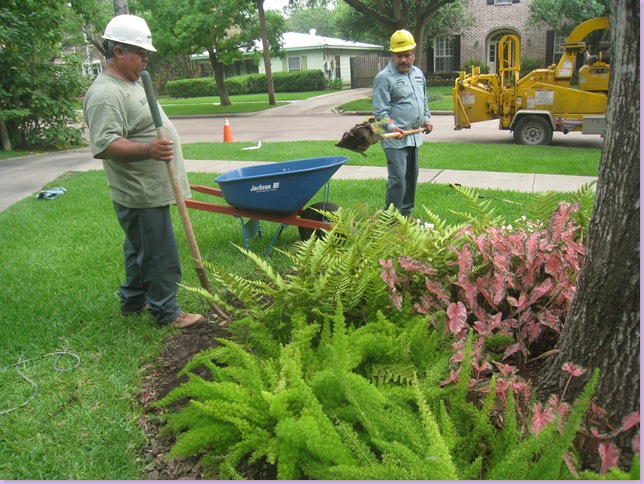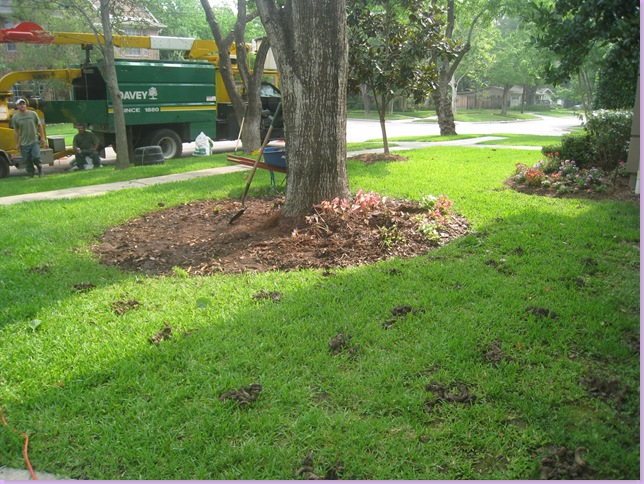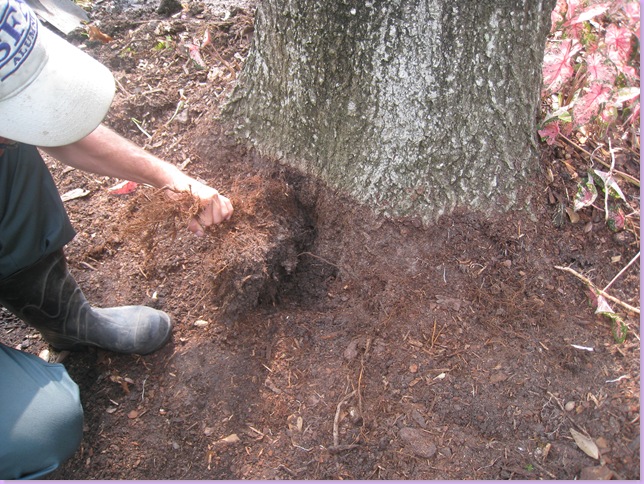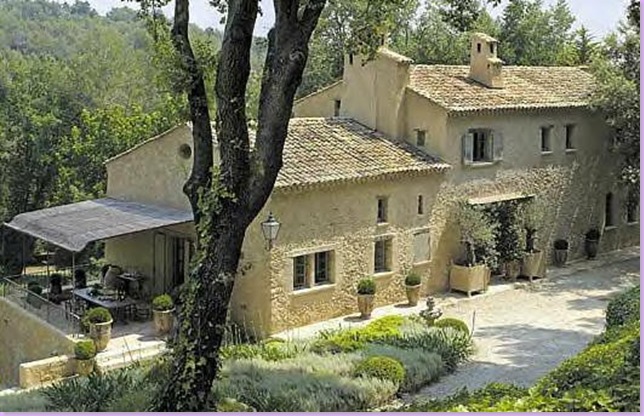My courtyard with spring flowers going crazy.
A few weeks ago, I wrote about my landscaping, bragging really, about how pretty all my flowers were this spring - you can read my braggadocious column here. I also wrote about how, when close to twenty years ago, we were looking for a lot to build our house on and we specifically chose this one because of a beautiful, huge, old water oak that was growing smack in the middle of the front yard. The tree's age and girth even affected the size of our house. In drawing up the floor plans, we shaved approximately five feet off of our front living room - so as not to be forced to cut any of the tree's roots. And then, we flipped our floor plan - putting the garage on the right as opposed to how it was originally drawn on the left, so that we could, of course, showcase the oak tree. As I wrote last April, our tree has been fruitful: one acorn from it produced a baby water oak at the edge of our yard. To save Baby Water Oak, when pouring our concrete driveway, we narrowed it from two lanes to one, a solution that hasn't been very successful - a few visitors have lost their rear view mirrors negotiating the narrow drive and the ominous tree trunk.
Baby Water Oak, grown from an acorn off the huge oak tree on our yard. It creates an obstacle course for visitors. Healthy and growing, no stress for this water oak.
Another acorn from our prolific old tree was taken by Mary, my mother in law, seventeen years ago, right about the time my daughter was born. And grow - they both did. Elisabeth's Tree, as it is known in the family, towers over Mary's yard, letting little sunlight filter in for grass to grow underneath it's branches. As you can surmise, we cherish our tree and nurture it. It's our responsibility. We prune it and feed it and schedule an annual preventive care regimen given by the tree care man. Yet, basically, we leave our tree alone to do what trees do: to shade us, give haven to the squirrels and a nesting home for the birds. People who visit often remark on the tree's beauty and we always agree, exclaiming our deep and profound appreciation for all that our beautiful water oak has added to our lives and our home.
Better days: last summer - lots of dark green leaves.
So, imagine, our horror at discovering that despite all our good intentions, we were killing our beloved tree. When I posted the picture of it last April, I wrote "it's just now getting it's leaves back after winter" - but in truth, the water oak never goes completely bald and by April, the tree should already have had all its new leaves, dark green and shiny. A few days ago, I really opened my eyes to the situation and realized, it's almost June, where are all the new leaves? Why are these leaves so tiny and so light colored? A rush of dread bubbled up as my mind raced - something is seriously wrong here and I placed a frantic call to the tree care man who assured me he would come by the next morning to take a look.
Stressed out tree - reduced canopy with smaller leaves.
The next morning, Ted, the tree man, proclaimed that yes, the tree was definitely stressed out, so stressed out that the leaf canopy was not what is should be. Most distressing of all was his news that we had caused it. You see, last year we added outdoor lights to the house and did some basic upkeep landscaping. Not much grass ever grew underneath the oak, so we decided to add a large flowerbed under the tree. We had it professionally installed by a landscaper. But the design perfectionist in me was never happy aesthetically with the flowerbed, and I had our yard man fix it up, move plants around, add more plants, add mulch, raise the bed, you know - just make it better. But instead, the yard man, not having a degree in Landscape Design or Forestry from Texas A&M raised the bed too high. About a foot too high to be exact. A tree needs its root collar to be exposed to breathe - who knew? Otherwise it suffocates and goes into stress and dies. Hopefully, we may be able to save it at this point, "as long as mushrooms don't start growing on the trunk," the tree man said. Huh???? Today a crew of those pesky illegal aliens showed up to take away all the gorgeous hydrangeas and ferns and begonias. What they left me with was a huge circle of dirt in the middle of my yard, and little holes all over, deep in the ground for "aeration."
The tree men starting their dirty work - I moved the ferns to the back yard.
Eeek - what I'm left with, an empty flowerbed and lots of holes in the ground.
The tree man pulls back the remaining layer of earth around the root collar to show how thick and dense the compacted dirt had become, actually suffocating the tree. You can see a line around the base where the soil came up to - almost over a foot too high.
And so, tonight, I'm left with the barren bed and an almost bare tree. It's all as ugly as can be, but hopefully, along with a regimen of medicine, our tree will start breathing again and will flourish. Hopefully. Otherwise, we're in the market for a either a new tree or a new home. Learn from our mistake: don't build up soil around the base of any tree. The soil should be level or even below level around the root collar. We were told we could plant ivy on the barren circle, as long as we don't add any soil. We'll see. We're going to give it time to just breathe. Do we think just removing the dirt will cure the stress? At this point, it's hard to believe - we're just going to have to wait it out.
If the tree does die, we're moving. It will be too hard to live here without it. We'll be in the market for a house like this, somewhere in the south of France. It's best to always look on the bright side, I've been told.

